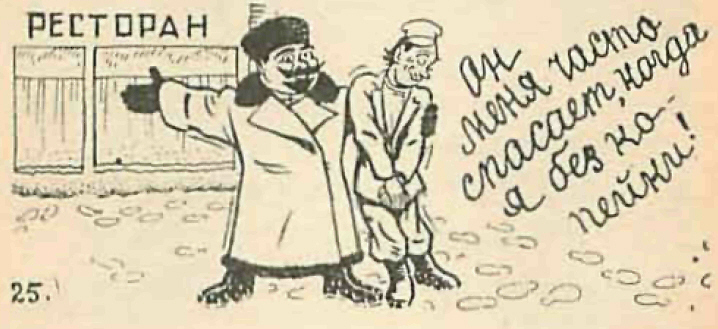
|
Languages
|
| Russian for English speakers 25 |
 |
| Lesson 25 |
|
Russian |
English Английский |
|
|
72 - семьдесят два |
seventy two |
|
|
73 - семьдесят три |
seventy three |
|
|
74 - семьдесят четыре |
seventy four |
|
|
75 - семьдесят пять |
seventy five |
|
|
Двадцать пятый (25-й) урок |
Twenty fifth lesson |
|
|
УРОК НОМЕР ДВАДЦАТЬ ПЯТЬ (№25) |
Lesson number twenty five (#25) |
|
| Вы любите тратить. | You like lo spend (money) | |
|
(деньги) |
AK: This means "You love to spend money". |
|
| 1 | Вы, я надеюсь, имеете (N. 3) кошелёк. | I hope you [you, I hope,] have [possess] (a) purse. |
|
AK: This means "I hope that you have a purse on you". |
||
| 2 |
Да, Вера, но я не знаю, |
Yes, Vera, but I (do) not know |
| сколько там денег. | how-much money (there is) in it [there]. | |
| 3 | Деньги (1) - вещь необходимая. | Money (is an) indispensable thing [thing indispensable]. |
| Мы не можем без них (2) жить. | We cannot live without it [without it live.]. | |
| AK: "We cannot live without them." | ||
| 4 | Мой друг Митя (3) едет со мною (4), | My friend Mitia (meet'ia) goes-away with me; |
| он всегда имеет много денег. | he always has [possesses] much money. | |
| 5 | Миша, Миша, |
Misha (meesha), Misha, |
| вы не серьёзный человек .. | you (are) not (a) serious man. | |
| 6 | Он меня часто спасает, когда я без копейки. | He often saves me when I am without a copeck. |
|
AK: "He often saves me when I am without a cent." |
||
| 7 |
Миша, ваше путешествие (5) плохо кончится... |
Misha, your journey will-end [itself] badly... |
|
AK: "You'll end up bad" or something like this. |
||
| 8 | вы любите тратить |
you like to spend |
|
(деньги, через чур) |
(money, too much). | |
| 9 | Вера, дайте мне сто рублей, | Vera, give me one-hundred roubles |
| и всё будет хорошо. | and all will-be well. | |
| AK: meaning "and everything willl be fine!" | ||
| 10 | В этом (6) я не сомневаюсь .. |
I (do) not doubt it (in that I (do) not doubt]. |
|
AK: Word by word : "In that, I don't doubt." |
||
| Вот вам двадцать пять. | Here-is 25 (roubles) for you. | |
| AK: Word by word : "Here is, to you, 25." | ||
| 11 | Мне недостаточно .. | This is not enough for me [to me insufficient]. |
| AK: wbw-meaning: "To me, is not sufficient." | ||
| Мне нужно сто рублей. | I need [to me necessary] one-hundred roubles. | |
| 12 |
Я имею, вы имеете, он имеет, мы имеем, они имеют. |
I have; you (pl.) have (eem'e'et'e); |
| 13 |
Много, немного; я надеюсь; я сомневаюсь. |
Much, a little / not much; |
|
УПРАЖНЕНИЕ |
EXERCISE. | |
| 1 | Без него я ничего не могу делать. |
Without him I can do nothing. |
|
AK: word by word: "Without him, I nothing, not can, to do" |
||
| Без него я ничего не могу сделать. |
AK: Use this for more natural speech. |
|
| 2 | Сколько у вас денег? | How much money have you? |
| Сколько вы имеете денег? |
AK: word by word: "How much you (pl.) have money?" |
|
| 3 |
У меня очень немного ou Я имею очень немного. |
I have very little. |
|
AK: all this Russian and French mix means |
||
| 4 |
Я готов, вы меня видите;
|
I am ready; you see me; |
| читайте со мною. | read with me. | |
|
|
AK: you can shorten it to "читайте со мной". |
|
| 5 |
Я боюсь, что это всё плохо кончится. |
I fear that all this will-end badly. |
|
AK: word by word : |
||
| 6 |
Я надеюсь, что у него (or что он имеет) много денег. |
I hope he has much money. |
| 7 | В этом я сомневаюсь. | [In this] I doubt (it). |
| 8 | Сколько именно вы хотите тратить? | How much exactly do you want to spend? |
|
Сколько именно вы хотите потратить? |
AK: this is more natural phrase. |
| NOTES. |
AK-NOTE |
|
| (N. 3) refers to number 3 of the next revision lesson, which is the 28th. | ||
| 1 |
Деньги
is money, in the nominative (subject-case). |
|
| 2 |
Деньги
being a plural, we have a plural pronoun
их - them, of them, |
▪ "ея",
"нея" in the original book instead
of "её,
неё" |
| 3 |
Митя, a pet name for Димитрий, Dimitri. |
Митя or Дима is a diminutive for Дмитрий. |
| 4 |
And here is a new case (the last one!) called the
instrumental, |
|
|
— С (вместе
с), with (together with),
takes an о
for euphony, |
It takes о in со мной / со мною, (together) with me . |
|
| 5 |
Путешествие
(poot'eshesst'vee'e), |
|
| 6 |
See note (5), lesson 24. |
"Prepositional case" is a case, "always used with a preposition". |
|
Tweested English Section |